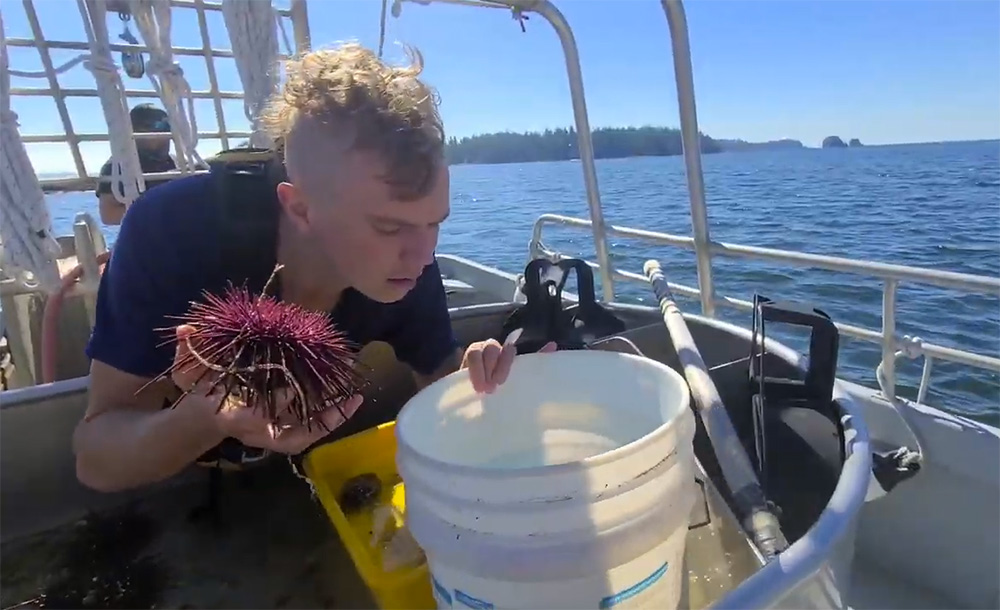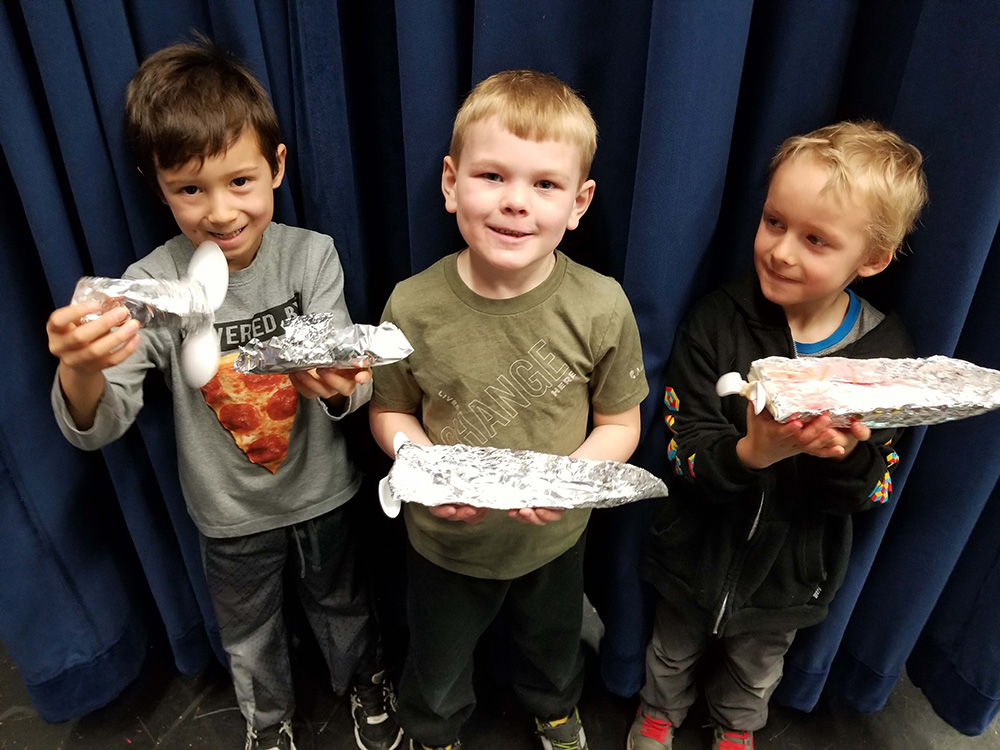The pandemic put an end to almost all school field trips in British Columbia, as popular destinations closed and districts avoided travel.
But once students couldn’t go to museums, historic sites and science centres, organizations set out to bring the experience to them.
It wasn’t just an educational issue. The organizations depend on field trip revenues to keep the doors open and staff employed and were quick to think inside the screen to keep relationships with schools going.
And the solutions are likely to bring permanent changes to how researchers, curators and tour guides interact with students.
The Bamfield Marine Sciences Centre, a not-for-profit education and research centre operated by the five universities including UBC, the University of Victoria and Simon Fraser University, found its scheduled school field trips were cancelled when in-class learning was suspended in March.
In a normal year, 3,000 to 4,000 grade school and university students from across Western Canada visit the centre in Huu-ay-aht First Nations territory south of Tofino on Vancouver Island. Trips can be for several days.
Students — the youngest in Grade 5 — join researchers on a boat to trawl for plankton, in the lab to see and touch a host of invertebrates or on the beach to discover what life the tide left behind.
But faced with an empty field trip schedule last March, centre employees got creative.
If they couldn’t bring in students for field trips — which costs about $140 per student, per day including accommodations — the centre would bring field trips to the students with live, interactive video chats with educators in the lab, at the beach or on boats.
Beginning with weekly live YouTube shows in April, the centre eventually created personalized interactive virtual field trips via Zoom that schools could book. The cost was drastically reduced to just $150 per virtual trip for a whole class.
“We don’t have it set up where we can see the students,” said Phil Lavoie, one of the sciences centre’s field trip co-ordinators. “But they can ask us questions and answer our questions through the chat function.”
Each webinar has space for up to 100 digital “connections,” whether that’s an individual student at home or entire classrooms.
Even before the pandemic, biology teacher Rhiannon Cockayne conducted classes online through the South Island Distance Education School. But she made a point of taking her students to the Bamfield Marine Sciences Centre every two years.
When she found out the centre was going digital during the pandemic, Cockayne jumped at the chance to take online field trips.
“The two field trips we’ve done, they’ve had three staff helping out. So they’ve been able to monitor the chat... and then the live presenter is interacting with that. I can’t emphasize it more: you really feel like you’re there,” said Cockayne.

The interactive element that allows students to communicate with researchers is key to the webinars’ success in replicating the field trip experience, she added.
“It was great to keep the students connected, even if it’s more screen time. It’s a different type of screen time, right? In the end, no replacement for the live visit. But if you can’t get there live, it’s pretty darn close.”
Virtual Gold Rush town
Despite having a son who works there, Sharon Cooley had never taken students to the Barkerville Historic Town and Park in the Cariboo region before the pandemic.
The recreated Gold Rush town has offered field trip opportunities for over 40 years and brings in 4,000 students every year. Or it did, before the pandemic.
Cooley, a retired principal who returned to teaching part-time at Kay Bingham Elementary in Kamloops during the pandemic, took her first school field trip to Barkerville last month without ever leaving the classroom.
“It was my whole classroom and myself Zooming with this Elder who works at Barkerville,” said Cooley, whose class took the “Barkerville and the Gold Rush: An Original People’s Perspective” virtual field trip, one of seven offered.
It fit with the Grade 3 and 4 social studies curriculum on Indigenous peoples’ history that Cooley is teaching her students.
And hearing directly from an Elder from the Xatśūll of the Secwépemc Nation made the lessons much more compelling for students, she noted.
“We had talked about how Aboriginal kids learn through storytelling from Elders, how they worked with Elders, how Elders were respected, how traditionally animals and people were equal,” she said.
But the Elder told stories and lessons that “really stuck with the kids,” Cooley said. “Because when I was telling them animals and people are the same, they’re kind of looking at me funny. But when he followed through with it, it was just awesome. It just dovetails so beautifully with what I was teaching with the curriculum.”
Students typically have to be at Barkerville in person during the May-June field trip season. The programs, aimed at Grades 4 and 9, are aligned with B.C. curriculum and let students visit a working blacksmith, the recreated offices of the old Cariboo Sentinel newspaper, and one of Canada’s oldest Chinatowns.
Students can even participate in a recreation of a real 19th-century trial. All for just $8 per student, not including transportation or accommodation fees.
But with the site shut down because of COVID-19, staff had to get creative to keep people on payroll and Barkerville on the minds of students and teachers.
It helped that James Douglas, who oversees field trips at Barkerville, is also a filmmaker. Separating staff into six groups of three to six people, Douglas helped staff recreate the field trip experience with daily interactive Zoom sessions.
“It could be one person [that] would be doing the tour, but they would have two people behind the scenes: one person operating the camera and the other person operating the computer to be able to interact with kids via text messaging and stuff,” said Douglas, responsible for public programming and global media development at Barkerville.
“I think the most we ever actually were running was 16 programs a day. But that was how we were able to then connect with students.”
Barkerville ended up presenting virtual field trips to 4,300 kids last spring, and almost 4,000 in the fall. Thanks to grant funding, schools could access the virtual sessions for free, opening Barkerville up to schools that may never have been able to afford the in-person experience.
“We got a slew of emails from teachers who just were thanking us for that, because it had always been something they wish that they could do with their students,” Douglas said. “And this at least gave them an interactive window into Barkerville, that allowed their students to even be there just in some way for a little bit.”
Live It online
Unlike Barkerville and Bamfield Marine Sciences Centre, Live It has always been online only.
But the B.C.-based online learning company, which offers interactive videos on nature topics as diverse as the Salish Sea, Arctic ice floes and active volcanoes, saw an opportunity to ramp up its business when schools were reeling from their sudden closures in March.
“Because of COVID, we took our three-year plan, which was to build a nature Netflix kind-of-style platform, and we turned it into a three-week plan,” said Mike Irvine, co-founder of the Nelson-based Live It.
Last spring the Live It team created 11 nature programs for students in Grades 3 to 8, which consist of a half-hour video, a live Twitter Q&A session with relevant researchers, and pre- and post-show activities to help teachers take the learning even deeper.
“It’s now a video-on-demand service, we found that was easier for everybody’s schedule,” said Irvine. “So you can do the activities in your own way, in your own time. And then we air the actual final program on a certain date at a certain time, and we have experts that are there online.” If students miss the live Q&A, they can still have their questions answered by experts later.
Live It offers videos in English and French, and has partnerships with organizations like ArcticNet, BC Wildfire Service and local First Nations, which help provide footage for their videos and expert context. Annual subscriptions to Live It are offered at $1,200 per school, or $125 per teacher using the resources and $60 per family.
Vanessa Tan, who teaches Grade 2 students in the Cowichan School District, has been using Live It in her classroom since 2018. In 2020 she used the Orca and Race Rocks programs on B.C.’s marine ecology.
“What was really high impact about those two in particular, was the way that students were invited to become ambassadors for the Salish Sea,” Tan said, adding the learning materials accompanying each video fit the provincial curriculum.
“As a teacher, it was so easy for me to just take the resources, adapt them to my students’ grade level, and then really engage them in some deep science before we even got to the virtual field trip,” Tan said.
“And then once we were watching the virtual field trip, we had activated so much background knowledge that the engagement in the virtual learning experience was really deep considering that we were separated by a screen.”
Live It’s goal, according to Irvine, is to improve nature literacy among young people. Tan says it’s succeeding.
For example, the Orca program included activities like using aluminum foil to design ship propellers and hulls that reduce the underwater noise that drives orcas from their natural habitats. It bolsters Tan’s belief that little people, like her seven- and eight-year-old students, are capable of understanding big concepts.
“It was so incredible to see how passionate they were about creating these quieter ships,” she said. “And you can really see how this type of learning, even though we weren’t able to actually be out there in the wild, it really stays with them because they remember these experiences so profoundly afterwards.”
Overcoming challenges
Taking field trips virtual presented its own challenges to institutions like Bamfield Marine Sciences Centre and Barkerville. They had to order more video conferencing gear when everyone in North America seemed to be trying to do the same thing and find solutions to spotty cell and wifi service.
And they had to solve the problems and build the programs while organizations and staff both faced financial challenges.
But there were upsides, as well, including providing access to education and resources some schools may never have been able to take advantage of before.
“Personally, I would like to keep the virtual program running,” Bamfield’s Lavoie said, adding they already have six virtual field trips booked for this month.
“We’re getting a lot of schools that maybe can’t afford a field trip out to the sciences centre. But at least this way, we still get to interact with them. They still get to learn about the creatures and the organisms that we keep, learning about the environments.”
Every teacher interviewed told The Tyee they would take a virtual field trip again, even when in-person trips resume. Not to replace in-person trips, but in addition to them.
Educational sites share their enthusiasm.
“I’m not happy about the pandemic at all,” said Barkerville’s Douglas. “But I’m really glad that we had this opportunity to show people that there is this other way to access the stuff that we have here. So I think you’ll find that we’ll always do some level of virtual programming in Barkerville.” ![]()
Read more: Education, Coronavirus
















Tyee Commenting Guidelines
Comments that violate guidelines risk being deleted, and violations may result in a temporary or permanent user ban. Maintain the spirit of good conversation to stay in the discussion.
*Please note The Tyee is not a forum for spreading misinformation about COVID-19, denying its existence or minimizing its risk to public health.
Do:
Do not: